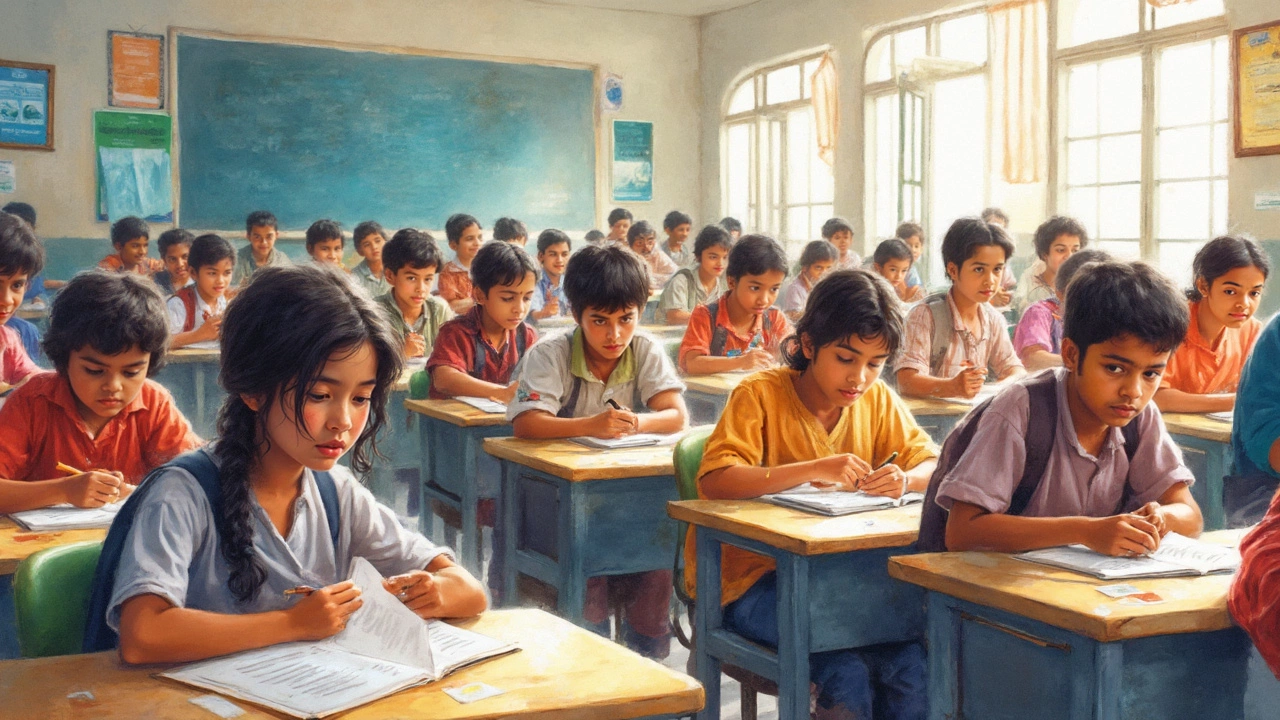So, the CBSE board exam—a term that many students, especially in India, know all too well. But what makes it such a tough nut to crack? To start with, the Central Board of Secondary Education (CBSE) doesn't just focus on rote learning. Think of it as a ride that takes you through a roller coaster of deep understanding and practical application.
Navigating the CBSE syllabus is often compared to training for a marathon. It's not about sprinting through textbooks; it's about consistency and endurance. The syllabus covers a broad range of topics, and it demands a level of understanding that goes beyond surface-level cramming. It's rigorous, yes, but it's also designed to prepare you for the real world.
Many students find managing time and pressure their biggest hurdles, but they're also key elements of success. So, how does one manage to conquer this seemingly insurmountable board? With the right strategy and mindset, it's entirely doable. The journey might be challenging, but it's definitely rewarding. Ready to dive into what makes the CBSE board the heavyweight of school exams?
- Understanding the CBSE Board
- Why CBSE is Considered Tough
- Surviving the Pressure
- Strategies for Success
Understanding the CBSE Board
The CBSE, or Central Board of Secondary Education, is like the backbone of school education across India, and it's recognized globally for its challenging curriculum. But what exactly makes it stand out? First off, CBSE's approach is all about holistic development. It doesn't just aim to stuff your brain with facts. Instead, it focuses on skills like critical thinking, problem-solving, and even emotional intelligence.
Founded in 1962, CBSE has always been about setting high standards in education. This board isn't just influential; it's huge. We're talking about over 19,000 schools worldwide, including a handful outside India. And if you're eyeing competitive exams like NEET or JEE, CBSE is your best friend because the syllabus aligns closely with these exams.
The grading system might look complex, but it's actually designed to reduce unnecessary pressure. Students are assessed on a scale from A1 to E2 in their board exams, where A1 denotes excellent performance and E2 means a student needs improvement. This system ensures that everyone has clarity on where they stand without feeling demotivated.
What else? CBSE has a knack for keeping the syllabus updated with the times. Be it incorporating computer-based exams or including essential life skills, CBSE ensures that students are prepared for the world beyond school.
Take a look at the distribution of students across different countries, showing the global reach of the CBSE board:
| Country | Number of CBSE Schools |
|---|---|
| India | 19,316 |
| UAE | 78 |
| Singapore | 30 |
| Saudi Arabia | 45 |
The global presence isn't just about numbers; it's a testament to the reputation and trust the CBSE has built over the years. So, whether you're a student in India or abroad, tackling the CBSE syllabus is about developing a lifetime love for learning.
Why CBSE is Considered Tough
The CBSE syllabus might be rigorous, but there's a good reason for it. It's not just about memorizing facts and acing the tests; it emphasizes a deeper understanding of concepts that goes beyond rote learning. This approach ensures students gain practical knowledge, making them more equipped for challenges beyond school.
The CBSE board exams are known for their comprehensive and detailed curriculum. You've got everything covered from tricky calculus problems to understanding the universe's mysteries through physics. It expects students not only to recall what they learned but also to apply that knowledge creatively and effectively.
Another key factor that makes CBSE challenging is the fierce competition. With millions of students appearing for these exams every year, the pressure to perform exceptionally well is intense. This isn't just an exam; it's a nationwide event that holds the future of numerous students in balance.
Moreover, continuous assessment through projects and internal evaluations adds layers to the overall preparation. Students aren't just judged on their ability to perform on a single day; instead, their consistency throughout the academic year counts significantly too. This kind of assessment pattern encourages regular study habits, which can be demanding but also incredibly rewarding.
Then there's the grading system. It's relative, meaning your performance doesn't just rest on your shoulders but also on how everyone else is doing. This system pushes students to give their best and sometimes leads to a perceived increase in difficulty.
Here's an interesting tidbit: CBSE subjects like mathematics have problem-solving sections that often include questions designed not just to test knowledge, but logical reasoning too. This means students have to be on their toes, ready to tackle problems from different angles.
All of these factors add up, giving CBSE its reputation as one of the hardest board exams. But remember, with challenges come opportunities, and mastering this board can open up a world of possibilities.

Surviving the Pressure
Alright, so you're staring down the barrel of the toughest board exam—the CBSE board. It's totally normal to feel a bit overwhelmed. But guess what? You're not alone, and there's plenty you can do to manage the pressure and come out on top.
First things first, let's talk time management. Balancing a wide syllabus with revision can seem like a Herculean task. Make a study schedule—but one that fits your style. Are you a night owl? Or maybe an early bird? Make your schedule work for you, and stick to it.
Now, practice makes perfect. This isn't just a saying—it's pretty much the golden rule for CBSE exams. Regular practice with past papers and sample tests can act like dress rehearsals for the real thing. It gives you an idea of the exam format and the types of questions you'll face.
And then there's the matter of keeping your cool. Letting stress pile up can throw even the best-prepared students off their game. Relaxation techniques like meditation or just a good walk in the fresh air can actually sharpen your mind. Taking breaks is as important as studying itself.
Let's not forget the importance of reaching out. Discuss topics with friends or teachers if you're stuck. Sometimes, explaining a topic to someone else can help reinforce your own understanding.
Also, don't skimp on sleep! Your brain needs downtime to process new information. Six to eight hours of sleep can mean the difference between a foggy morning and a productive day.
Remember, half the battle is maintaining a positive outlook. This is about learning, and while the stakes seem high, the CBSE syllabus is designed to set you up for future success.
Strategies for Success
Taking on the CBSE board exams might feel like facing the ultimate boss level in a video game. But don't worry; with the right strategies, you’ll get through it stronger than ever. So, you want to know how to nail this? Let's break it down.
First things first, understand the CBSE syllabus inside out. You shouldn't just skim through your textbooks. Make a list of all topics, focus on understanding concepts, and identify areas where you need extra help. Without a clear map, you're just wandering.
Time management is crucial. Design a study timetable that doesn't just look pretty on paper but actually works. Balance is key. You want to distribute your hours in a way that gives you time for revision, practice tests, and yes, some chill time too. Overloading isn't going to help you remember that physics formula any faster.
Practice makes perfect, and past papers are your best friend here. Solve as many as you can. They give you a feel of the CBSE exam pattern and also help you manage time under pressure.
Self-testing could be your secret weapon. Regular quizzes and mock tests will help reinforce your learning. There’s nothing like the satisfaction of seeing consistent improvement in scores.
And hey, don't go solo. Discussion is the spice of learning. Join study groups, talk with teachers, or chat with classmates online. Different perspectives can make confusing topics clearer.
If you’re into numbers, here's a fun fact:
| Subject | Average Study Hours Needed |
|---|---|
| Math | 2-3 hours/day |
| Science | 3-4 hours/day |
| Languages | 1-2 hours/day |
Because, let's face it, some subjects eat up more time than others.
Lastly, don’t ignore your mental health. A healthy routine with breaks, exercise, and relaxation isn’t just good advice for life—it's essential for brainpower during exam prep. Remember, it's not a sprint; it's a marathon. So hydrate, eat well, and get those Z's.
With these strategies in your toolkit, tackling the CBSE board doesn’t have to be just stress and headaches. You got this!
